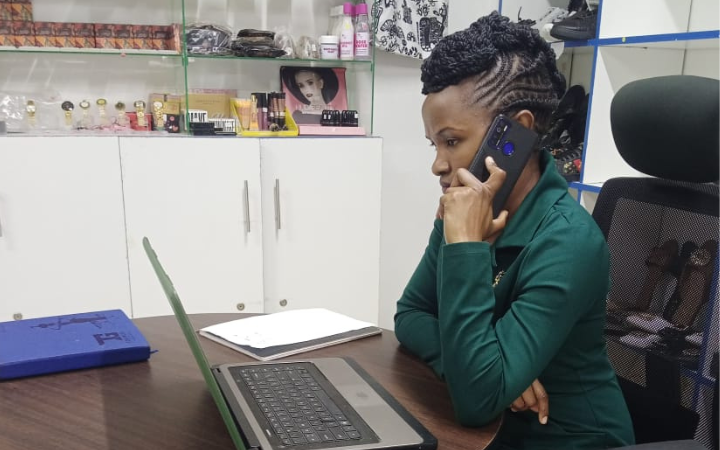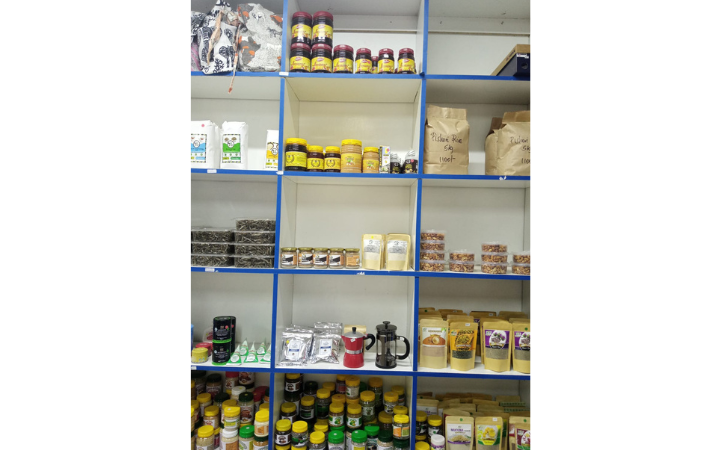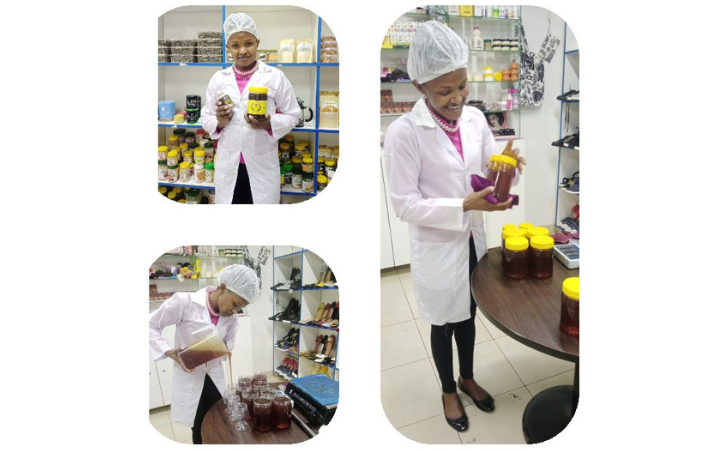- Angeline Mueni Mutuku, the entrepreneur from Kenya, participated in the second round of the UNITAR Entrepreneurship, Innovation and Leadership Training for Women Entrepreneurs in Africa.
- After losing her job at the peak of the COVID-19 pandemic, Angeline started her business selling pure honey and pishori rice.
- Angeline considers the UNITAR programme as part of her personal development by building her skills and confidence to excel in her business and serve as an example for women.
- UNITAR Division for Prosperity partnered with Absa Bank and Sunlight’s “Women of More” to train women in entrepreneurial skills, financial and digital literacy.
- The third round of the programme was launched on 14 October 2022 with nearly 1,500 participating Kenyan entrepreneurs.
November 2022, Hiroshima, Japan – The challenges of running a business can discourage many potential entrepreneurs. However, some people rise to the challenge. In the town of Thika in Kiambu County, Kenya, Angeline Mueni Mutuku started her business during the COVID-19 pandemic. Seizing opportunities and gaining skills, Angeline continues to grow her business.
Angeline studied business administration in college and worked as an insurance agent and then as a bookkeeper. But after getting laid off in June 2020, at the peak of the pandemic, Angeline needed a new opportunity. She asked herself what viable business products could help her pay bills and engage with the local community.
Startup: Going outside the comfort zone
In 2019, Angeline registered Angekelly Enterprises, hoping to start her own business one day. The tough pandemic times spurred her into action. Angeline noticed the demand for pure honey rise as more people sought it to boost their immune systems. Thinking fast, she started her business at a minimal cost selling pure honey and pishori rice online.
The first major challenge of taking orders was solved by family and technology: family members helped her get a smartphone to start operations. Angeline could then navigate the online platforms for marketing, running operations and delivery. Eventually, social platforms led her to even more opportunities.
Expanding her business
With demand high for her products, Angeline decided to expand her business. In November 2021, she rented space to serve as a physical shop and her office. She explored other raw materials and products with health benefits and minimal processing to add to her shelves and introduced new products such as bee propolis and peanut butter.
To maintain quality, Angeline got local training on how to test her products. By selling only high-quality pure honey, Angeline started a chain of recommendations; the business’s reputation grew.
In another course, she learned an affiliate product strategy and put it into practice: honey and rice are also sold in stores selling other products like shoes, clothes and skincare. If someone enters the shop to buy another item, they may then look to buy one of her products too.
Investing in herself with UNITAR
Angeline was using Facebook to promote her products and connect with community members. While on the social network, she saw a post from a friend about a UNITAR business course. UNITAR, in partnership with Unilever’s Sunlight “Women of More” and Absa Bank Kenya, had started a programme for women entrepreneurs across Kenya.
The Entrepreneurship, Innovation and Leadership Training for Women in Africa programme is for women business owners who want to learn and make a positive impact on their community. It teaches the participants about social entrepreneurship and financial and digital literacy.
Learning is a process and learning never stops. – Angeline Mueni Mutuku
Angeline applied to the course and completed it. She enjoyed having the courses online and self-paced, which made it easier for her to learn on her own time and revisit lessons.
She continues to see the value of the lessons on connecting with her community through social responsibility. For example, her business sells products from local farms to contribute to the local economy. In the future, Angeline hopes to open her bee farm, which will not only create jobs but – by sharing product samples and hosting community activities – contribute to community growth.
Vision and growth
By owning a business and taking on its challenges, Angeline has experienced significant personal growth. Angeline credits part of her success to UNITAR’s lessons in corporate social responsibility, which taught her to believe in herself and the power of learning.
Angeline sees the value of her experience, especially as most businesses are operated by men. She believes there is room for women-run businesses to grow in her part of the world and that learning will empower girls and women to run their own meaningful businesses.
It’s doable. You only need confidence. You only need to believe in yourself. And then you get it done. Because if you don’t get it done, then who will? – Angeline Mueni Mutuku
The third round of the Entrepreneurship, Innovation and Leadership Training for Women in Africa was launched on 14 October 2022 with nearly 1,500 Kenyan entrepreneurs participating. UNITAR welcomed the participants who aspire to use their businesses to make a positive impact on their communities.
About UNITAR
The United Nations Institute for Training and Research (UNITAR) is a dedicated training arm of the United Nations. In 2021, UNITAR trained 370,139 learners around the world to support their actions for a better future. In addition to our headquarters in Geneva, we have offices in Hiroshima, New York, Bonn and various networks around the world.
One of the eight divisions of UNITAR, the Division for Prosperity, based in the Hiroshima Office and Geneva Headquarters, seeks to shape an inclusive, sustainable and prosperous world. World-class learning and knowledge-sharing services on entrepreneurship, leadership, finance and trade, digital technologies, and nuclear disarmament and non-proliferation are offered. We empower individuals from developing countries – especially women and young people – to address inequalities. Our alumni are making a difference in least-developed countries, countries emerging from conflict, and small-island developing states.




